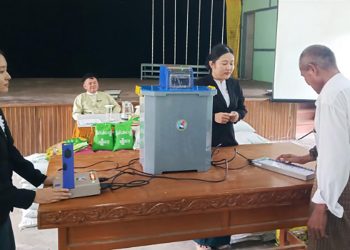Two-and-a-half years after Min Aung Hlaing unveiled his plan to create a metro rail system and launch fleets of electric buses in Myanmar, the junta boss has called the country’s troubled power supply a challenge to his regime.
Addressing a meeting with cabinet members of his regime on Tuesday, the junta leader admitted that current production can’t even meet half of domestic demand, as Myanmar has experienced serious power outages since the coup.
He told the meeting that the country would have no power outages if suspended mega electricity projects had been implemented, according to attendees of the meeting, referring to suspended projects like the China-backed Myitsone Dam Project.
When his speech was reported in the junta’s propaganda papers, the reports did not refer specifically to the Myitsone Dam Project, simply citing the junta leader as saying that the suspension of hydropower projects that were initiated some 10 years ago was to blame for power outages.
The US$3.6-billion project was shelved by then-President Thein Sein in September 2011 amid widespread public concern over the dam’s social and environmental impacts, upsetting China.
Min Aung Hlaing reportedly told the Tuesday meeting that if the Myitsone hydropower plant was operating today, it would be able to satisfy around 90 percent of national requirements, according to attendees.
The dam project agreement was signed in 2009 under the previous military government led by Than Shwe.
Under the original deal, China’s state-owned China Power Investment Corporation was to own 80 percent of the project, the Myanmar government 15 percent and Myanmar-based Asia World the rest.
Min Aung Hlaing’s mentioning of the dam at the meeting on Tuesday marked the second time the regime has expressed interest in the Myitsone project.
In May, Major General Yang Yang, acting director-general of the Intelligence Bureau of the Joint Staff Department of China’s Central Military Commission, met the junta’s No. 2 official, Soe Win, for talks on “cooperation between the two armies.”
During the meeting, Soe Win reportedly proposed a resumption of the dam project, prompting speculation that the regime is desperate for further endorsement from Beijing, including an official invitation for Min Aung Hlaing to visit China.
It’s unclear whether Min Aung Hlaing’s raising of the issue is a sign that he is gearing up to resume the project—both to cover the country’s insufficient electricity supply and to win Beijing’s endorsement of his junta.
Currently, the dam project is in limbo, though Beijing often suggested resuming the project under the now ousted National League for Democracy government.
Faced with sanctions from Western countries, Myanmar’s military regime has invited more Chinese investments in Myanmar. Among the investment projects are three wind power projects in Rakhine State. The junta’s electricity minister also flew to Yunnan and invited the provincial government and Chinese investors to invest in Myanmar’s electricity sector.
Min Aung Hlaing’s plan to generate electricity from hydropower, solar power and wind and coal as well as nuclear technology with help from China and Russia has so far borne no fruit, and as such the junta leader has repeatedly asked Myanmar people not to waste energy.
Meanwhile, the junta is able to provide only a few hours of electricity per day in the country and Min Aung Hlaing has sacked two electricity ministers so far.

















